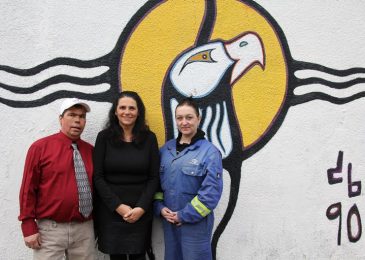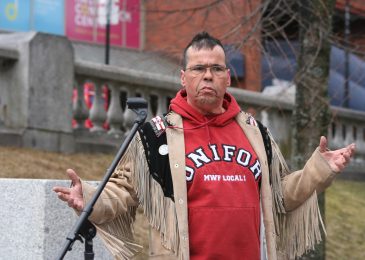In Nova Scotia labour circles David Ladouceur is widely known as an outspoken and effective union and indigenous rights activist.
Ladouceur, an Ojibwe, moved from Ontario to Nova Scotia in 1990. After doing odd jobs for several years, he ended up doing ship maintenance work with some small companies here in Halifax. Ladouceur bounced around from company to company, until in 2001 he landed a job at the Halifax Shipyard, at that time under CAW local 1.
Within the union environment Ladouceur gained the confidence to speak out about injustices in the workplace, in his local, and wherever else he encounters it. He is currently the vice president of Unifor/Marine Worker Federation Local 1.
In our conversation we talk about the origins of his activism, obstacles and supports within the union, and the high hopes he has for the Pathways to Shipbuilding pilot project, an apprenticeship program to create job opportunities at the Irving Shipyard for 20 indigenous students.
This article was originally written for RankdandFile.ca – Canadian Labour news and analysis from a critical perspective
Unions can be the catalyst
I heard the story of Shannen Koostachin, this 13 year old girl of Attawapiskat First Nation who fought for a new school on her reserve, rather than having to put up with a bunch of dilapidated trailers. I was very inspired by her story and it became my driving ambition to see equity for First Nation children, to make sure that government services are there for them, not only in education, but also in healthcare.
To me Shannen was a hero. It very much touched my heartstrings when she was killed in a car accident. As a result I became involved with the First Nations Child and Family Caring Society. I use my union involvement to further that cause. It’s a two way street, and it’s a great fit.
Some people realized where I was going, but others within the local pushed back. The Halifax shipyard, for lack of a better term is a a bit of an old white boys club. If you don’t push back you are quickly caught in the undertow.
My focus for the last six years has been to get things to change, within the local and at the national level as well. When the union talks the talk, you have to make them walk the walk. I think that’s my role.
As a result of my my activism I got elected to the position of Sergeant at Arms within the local, and from there I started to get more opportunities to get educated in the union movement, to go to conferences. Those experiences gave me the courage to speak up. That was good, because I was recognized, my thoughts were appreciated, and to me that was a big thing.
These days I lead discussions for with Unifor, I teach a human rights course, and I am involved in Unifor’s Aboriginal and Workers of Colour program. It’s a 40-hour program and it covers topics like colonialism, and anti-racism activism. We also have monthly meetings. It is empowering, and it offers people a safe space, so we can express our concerns. It is exciting to see people find their voice. Often there is no place to be heard in the workplace, and then you shrivel up and die.
Unions can be the catalyst. Without the mentorship of people like (Unifor Atlantic Director) Lana Payne, and her predecessor Les Holloway, who both reached out to me and realized what was there, there would be no me.
We let other people do our thinking for us
It’s been a hard push to get the apprenticeship program on the rails, I’d say for six years I have been pushing for it. I had meetings with the company, some of them not so nice. Things fell into place this year. It was big announcement they had people from Ottawa coming down. They wouldn’t let me attend the press conference, they never invited me.

It’s as if people now think that the work is done. But there is a ways to go. Within the shipyard we have 640 employees, and only about eight aboriginals that have identified to me. It is disheartening. They are talking about 20 apprentices to start. It’s still a drop in a bucket. If it works here, it will go across Canada. We can’t allow it to fail.
We still hear a lot of “they all have criminal records, they don’t show up on time,” stuff like that. These perceptions are so prevalent that you are walking through the door with a strike against you already. That’s what this program is all about, opening doors and getting rid of these preconceived notions.
We will take part in the interview process. The Mi’kmaw Native Friendship Centre is key in terms of recruiting and, helping with the interviews. My role is to explain what it is like to be a shipyard worker, what you will be facing.
We let other people do our thinking for us, you see that a lot. That eats up all our time, what other people think. But no matter what we do, we are not going to change their thought processes. So it is up to us as workers of colour and as minorities to say ‘if you want to continue thinking that way, that’s fine for you, but it’s not working for us.’
What I see is the inner growth of people, that’s what we have to reach for. We have to build leaders within our own community. The black community in Halifax is going through some terrible times, and they have unemployed youth, and the opportunities just aren’t there.
I think the Pathways to Shipbuilding approach could not only help the indigenous community, but the black community, people who live with disabilities, the whole nine yards. I really have high hopes for this program.
Unions are about helping one another. That’s where the strength comes from. This conversation should be about what the union did, not what I did.
I have really grown within the union, inside and out. I had a rough youth, and for a large part thanks to the union I have been able to get up. Being part of a union is much more than just paying your dues.
This interview was edited for clarity.




